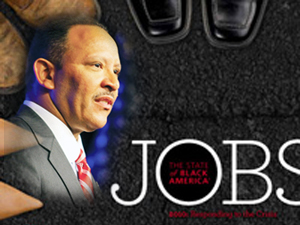–
Targeted jobs program needed in bad economy

WASHINGTON (FinalCall.com) – “Chronic unemployment” persists in Black communities, which is helping to worsen the racial “equality gap” in this country in education, housing and social justice: That is the true “State of Black America 2010,” according to the National Urban League.
“I believe that we’re at a time of crisis and crossroads,” National Urban League President Marc Morial told The Final Call March 24. “We can’t celebrate when the unemployment rate is 15 percent and so many people have lost their jobs. What we can do is be inspired and hopeful that with the president and this congressional leadership team, that we can try to move the ball and get some things done. That’s why we’ve placed so much, so much emphasis on our recommendations. Not just, ‘What is the problem?’ but here are real solutions.”
The NUL’s proposed solution? A six-point jobs plan that would invest $168 billion over two years into job creation, job training, greater access to credit for small businesses, additional counseling for those in the foreclosure crisis and tax incentives for clean energy manufacturers who employ individuals in targeted communities.
The day the “State of Black America” report was released, the House of Representatives passed yet another jobs bill on March 24. It aims to provide tax relief for small businesses and create bonds to help local governments fund infrastructure projects.
It is one in a string of jobs bills passed by Congress to bring down historically high unemployment rates. Just one week earlier, President Obama signed the HIRE Act.
But for some Black leaders, that’s not enough. Congress and the president need to do more to stimulate job growth in their communities.
“Congress has passed a number of jobs bills,” Mr. Morial told reporters. “Those jobs bills are excellent steps in the right direction. But this team doesn’t need a bunt. This team needs a home run. This team doesn’t need a field goal, this team needs a touchdown.
“So I’ve said to people: The way policy should be constructed should be to place an emphasis on those that are chronically unemployed, whether they’re White, Black, Hispanic, or Asian. That emphasis should be placed on communities where the unemployment rate is high. Where the poverty rate is high. That sort of targeting will impact our community.”
The report acknowledged that Blacks have made incremental gains in overall equality with Whites as measured partly by their high voter turnout in 2008. Still, Blacks lag in homeownership rates and are almost twice as likely to be unemployed and lack health insurance.
The 2010 NUL “Equality Index” for the Black-White comparison stands at 71.8 percent, compared to the 2009 index of 71.2 percent.
The report for the first time also addresses inequality for Latinos, the nation’s fastest growing demographic group. It noted that Latinos face many problems similar to Blacks and in some areas such as voter participation, insurance coverage and college enrollment, they may lag behind Blacks.
This year’s “State of Black America” report includes policy discussions and essays from academics, business leaders and members of the Obama administration including Labor Secretary Hilda Solis and Education Secretary Arne Duncan.
The “State of Black America 2010” report comes after Mr. Morial, the Rev. Al Sharpton and NAACP President Benjamin Jealous met with President Obama at the White House in February to press for aid where there are large numbers of minority group members who are “hurting.”
Mr. Morial said that during the White House meeting, President Obama expressed an “overall understanding that additional significant steps needed to be taken. I do believe he will pay attention.
“We want to send the most powerful message: The strongest message possible. That a nation which can invest trillions of dollars, bailing out banks and financial institutions, can and should and must pass a jobs bill that matters in America’s communities,” said Mr. Morial.
More aid is needed in order to help the “chronically unemployed,” who have less education and jobs skills and are disproportionately Black and Latino, according to the report. That “jobs bill” passed the week before the NUL report contains a modest mix of tax breaks and spending for highway and transit programs, and is expected to generate perhaps 250,000 jobs by year’s end, a fraction of the 8.4 million jobs the economy has dropped since the recession began in 2007.
Nearly 20 percent of Blacks do not have health coverage, compared to about 11 percent for Whites, Mr. Morial pointed out, noting that disparities in health care extend beyond insurance to “access to fresh food and groceries, access to physical education, recreational activities and sidewalks to walk on.”
This year’s was the 34th annual edition of the NUL’s “State of Black America” report. The league itself was founded in 1910 to foster Black economic equality, but even in its 100th year, the National Urban League still reports progress has been slow.












